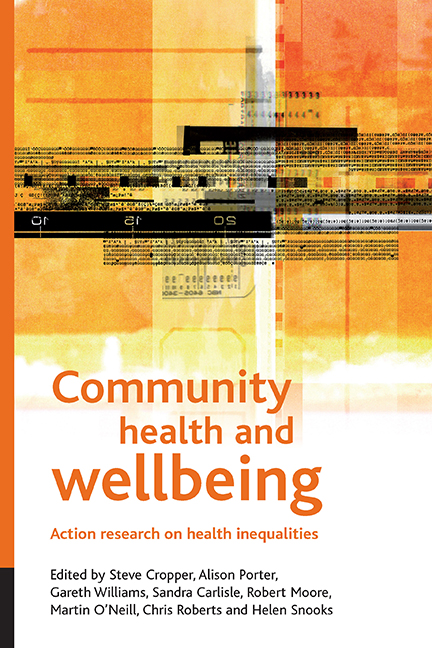Book contents
- Frontmatter
- Contents
- List of tables and figures
- Preface
- Acknowledgements
- Notes on contributors
- one Health inequalities in their place
- two ‘Policy experiments’: policy making, implementation and learning
- three Policy innovation to tackle health inequalities
- four Action research partnerships: contributing to evidence and intelligent change
- five Engaging with communities
- six The role of the community-based action researcher
- seven Evaluation, evidence and learning in community-based action research
- eight Social theory, social policy and sustainable communities
- nine Beyond the experimenting society
- Index
- SHARP DVD: A Way of Working Together to Improve Our Lives
nine - Beyond the experimenting society
Published online by Cambridge University Press: 15 September 2022
- Frontmatter
- Contents
- List of tables and figures
- Preface
- Acknowledgements
- Notes on contributors
- one Health inequalities in their place
- two ‘Policy experiments’: policy making, implementation and learning
- three Policy innovation to tackle health inequalities
- four Action research partnerships: contributing to evidence and intelligent change
- five Engaging with communities
- six The role of the community-based action researcher
- seven Evaluation, evidence and learning in community-based action research
- eight Social theory, social policy and sustainable communities
- nine Beyond the experimenting society
- Index
- SHARP DVD: A Way of Working Together to Improve Our Lives
Summary
Introduction
The poor health in some of Wales’ more deprived communities could make the Sustainable Health Action Research Programme (SHARP) seem less like a bold experiment and more like a very inadequate sticking plaster on a deep and bloody wound. Nonetheless, to fund seven action research projects of the kind discussed in this book over a relatively long time period, as part of the wider programme of policy development, signalled a genuine commitment to a radical approach to health improvement for Wales. As Robert Moore indicated in Chapter Eight, the programme of community-based, public healthorientated action research to address health problems in disadvantaged communities was captured most clearly and forcefully in the Welsh context in Better Health – Better Wales (Welsh Office, 1998), a White Paper in which a distinctively Welsh agenda for health was set out for the first time. Within this agenda, SHARP emerged as a clear, but unelaborated, commitment to developing a health improvement strategy that recognised the social determinants of health and did more than reiterate the need for individual behaviour change.
It is easy when confronted by the immediate problems of poor health to put aside everything that is known about the wider determinants of health and the need for ‘upstream’ solutions. This is partly because of the popular and media pressure to deal with health (or sickness) services, waiting times and the availability of new treatments. However, it is also because, for all our considerable knowledge of the determinants of health, the links between socioeconomic position and mortality and the patterns of limiting long-term illness, evidence on specific interventions to address these problems is less easily identified, less robust, or so focused on one particular issue that the important wider context disappears from view. While there are growing numbers of specific interventions to address, say, tobacco use and diet among children and young people, broader community-based initiatives have been less easy to implement and test. They are ‘wicked problems’, as Steve Cropper and Mark Goodwin note in Chapter Two, for which simple evidencebased prescriptions are not readily available – interventions are about institutional and institutionalised change as much as the adoption or establishment of a service.
- Type
- Chapter
- Information
- Community Health and WellbeingAction Research on Health Inequalities, pp. 199 - 220Publisher: Bristol University PressPrint publication year: 2007

